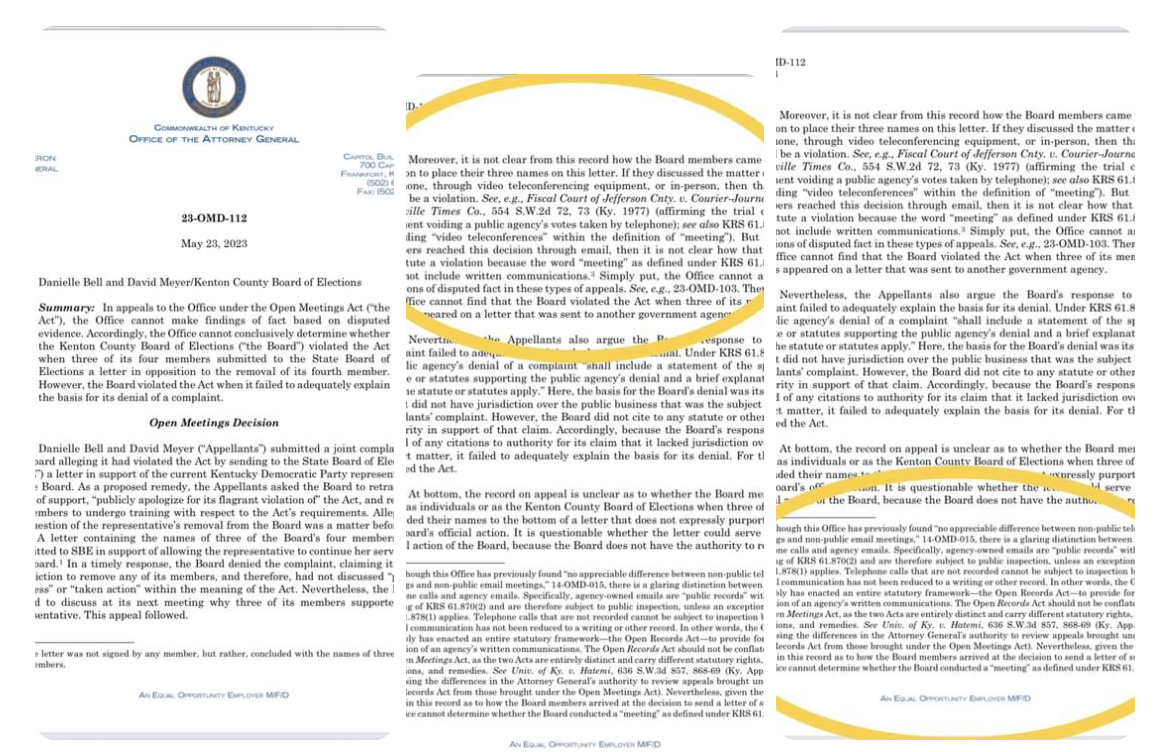
Attorney General Daniel Cameron’s assault on Kentucky’s open government laws continues.
This time Cameron has made good on his threat to narrow the definition of the term "meeting” to exclude from the application of the open meetings law electronic communications -- in this instance, by email or text -- between a quorum of the members of a public agency, that relate to public agency business.
Once again, we ask that you let that sink in.
The open meetings decision Cameron issued on Tuesday is a license to officials to abuse the public’s right to observe “the formation of public policy” and to conduct public business “in secret” by the simple expedient of communicating about the public’s business outside an open, public forum by text, by email, or by some other form of electronic communication.
https://apps.legislature.ky.gov/law/statutes/statute.aspx?id=23042
On May 8, the Kentucky Open Government Coalition warned of this anticipated assault. We noted that the holding in an open meetings decision issued a few days before — involving serial less than quorum meetings of school board members to coordinate the dismissal of the board attorney and hire a new attorney — was disappointing but not surprising.
We focused not on the unremarkable but unfortunate outcome in the decision but on a footnote in the decision that “portends open meetings disaster.”
https://kyopengov.org/blog/attorney-general-redefines-meeting-open-meet…;
The referenced footnote in the May 2 open meetings decision — In re: Larry Bryson/Laurel County Board of Education — suggested that “a discussion of public business by ‘written communications, such as emails,’ between a quorum of the members of a public agency is not subject to the open meetings law because “that interpretation lacks textual support from the Act. It also lacks any basis in what the word ‘meeting’ means.”
https://www.ag.ky.gov/Resources/orom/2023-OROM/2023/23-OMD-103.pdf
The decision characterized as “questionable” past Attorneys General open meetings decisions that treated discussion by email and text between a quorum of a public agency’s members — concerning “public business” — as “meetings” that violate the law because they necessarily exclude the public.
In less than a month, Cameron’s narrow interpretation of “meeting” has graduated from legal dicta — a suggestion that is not necessary to resolve the dispute — to an equivocal “holding” in the open meetings decision issued on May 23, In re: Danielle Bell and David Meyer/Kenton County Board of Elections.
https://onedrive.live.com/?authkey=%21AL%5Fp2Zq3nohV2XQ&cid=52886E6CE35…
Cameron finds a violation based on the Board of Elections’ failure to adequately explain the basis for its denial of Bell’s and Meyer’s open meetings complaint.
But — and here’s the rub — he dubiously claims that “it is not clear from this record how the Board members came to [their decision].”
“If,” Cameron writes, “they discussed the matter on the telephone, through video teleconferencing equipment, or in-person, then that would be a violation. See, e.g., Fiscal Court of Jefferson Cnty. v. Courier-Journal and Louisville Times Co., 554 S.W.2d 72, 73 (Ky. 1977) (affirming the trial court’s judgment voiding a public agency’s votes taken by telephone); see also KRS 61.805(1) (including ‘video teleconferences’ within the definition of ‘meeting’). But if the members reached this decision through email, then it is not clear how that could constitute a violation because the word ‘meeting’ as defined under KRS 61.805(1) does not include written communications.”
https://apps.legislature.ky.gov/law/statutes/statute.aspx?id=23043
Cameron adopts Jefferson County Fiscal Court v. Courier Journal as to meetings by telephone, but fails to note that this early open meetings opinion is premised on the recognition that the open meetings law “is designed to require government agencies to conduct the public’s business in such a way that the deliberations and decisions are accomplished in an atmosphere wherein the public and the media may be present.”
(A press release by the Kenton County Democratic Party — issued shortly after Cameron’s decision was released — disputes any ambiguity in the facts, concluding that records submitted along with the appeal filed by Bell and Meyer eliminate any doubt “that the Kenton County Board of Elections has been acting in secret and hiding information from the public.”)
https://kentoncountydemocrats.org/news/f/summe-county-board-of-election…;
In yet another fatal footnote, Cameron rejects past Attorneys General’s interpretation of “meetings.”
“Although this Office has previously found ‘no appreciable difference between non-public telephone meetings and non-public email meetings,’ 14-OMD-015, there is a glaring distinction between agency telephone calls and agency emails. Specifically, agency-owned emails are ‘public records’ within the meaning of KRS 61.870(2) and are therefore subject to public inspection, unless an exception under KRS 61.878(1) applies. Telephone calls that are not recorded cannot be subject to inspection because the oral communication has not been reduced to a writing or other record. In other words, the General Assembly has enacted an entire statutory framework—the Open Records Act—to provide for public inspection of an agency’s written communications. The Open Records Act should not be conflated with the Open Meetings Act, as the two Acts are entirely distinct and carry different statutory rights, agency obligations, and remedies.”
Good luck getting those emails and texts under the open records law.
In the final analysis, Cameron’s controversial and contested interpretation of “public records” — which excludes emails and texts concerning public business exchanged by public officials on private devices and/or accounts from the open records law — coupled with his equally controversial (and apt to be contested) interpretation of “meeting,” is an invitation to public officials and agencies to conduct the public’s business in officially sanctioned secrecy.
https://apps.legislature.ky.gov/law/statutes/statute.aspx?id=51390
https://amp.kentucky.com/news/politics-government/article257710593.html


